North Korea Notches Up Its Nuclear Stridency
A new law saying the North could fire off a nuke automatically if attacked should snuff the hopes of even the most optimistic officials and analysts who persist in thinking they can negotiate a denuclearization deal.

SEOUL — North Korea’s strongman leader, Kim Jong-un, has an explicit message for the world: His country is a nuclear state and it could make use of its nuclear warheads at any time.
The dictator’s remarks, delivered in a speech before the Supreme People’s Assembly passed a law saying the North could fire off a nuke automatically if attacked, should snuff the hopes of even the most optimistic officials and analysts who persist in thinking they can somehow negotiate him into a deal for giving up his nukes.
Alluring though it’s always been in the quest for negotiation with the North, that dream should finally be laid aside as fantasy. Forget about denuclearization, is Mr. Kim’s message, more harshly and explicitly stated than any of his previous diatribes against Washington and Seoul.
The Americans, in addition to working “to eliminate our nuclear weapons,” he said, want “ultimately to bring down our regime.” By making the North “put down nuclear weapons,” America would “weaken the power to exercise self-defense.”
The law enacted by the Supreme People’s Assembly authorizes an “automatic nuclear strike” on the origin of any attack on the North or attempt to replace Mr. Kim as leader. The same law legalized Mr. Kim’s “monolithic command” with “decisive powers” over nuclear weapons.
If Mr. Kim would have seemed to have long since acquired such total power, he evidently felt the need to re-enforce it while South Korea’s new president, Yoon Suk-yeol, is tightening the South’s alliance with Washington. American and South Korean forces last week completed their first field exercises in five years, and Mr. Yoon and his ministers have been mingling tough talk with offers of negotiation that North Korea has rejected.
At a gathering here of military officers and officials from dozens of countries, the South’s vice defense minister, Shin Beom-chul, said it would “be no surprise” if North Korea were to conduct its seventh nuclear test — its first since September 2017. “The present threat is not only to Korea but the entire world,” Mr. Shin told the annual Seoul Defense Dialogue this week.
“There should be serious consequences,” he warned. “We need to deter North Korean attempts.” In fact, he said, “If necessary, we may have a counter-attack against North Korea.”
Mr. Kim’s remarks seemed to have been calibrated to answer that and numerous similar comments from South Korean leaders. The specific timing for his talk was the 74th anniversary of the formal founding of North Korea as the Democratic People’s Republic of Korea in 1948 under his grandfather, Kim Il-sung.
South Korea responded by reiterating an offer of aid that North Korea has summarily rejected. By increasing the nuclear threat, a foreign ministry spokesman said, North Korea strengthens the Seoul-Washington alliance while “further isolating itself from the international community and worsening economic difficulties facing the North Korean people.”
That warning was not likely to have the slightest impact. By imposing the “biggest-ever sanctions and blockade,” Mr. Kim said, Washington was guilty of “misjudgment and miscalculation of adversaries.”

